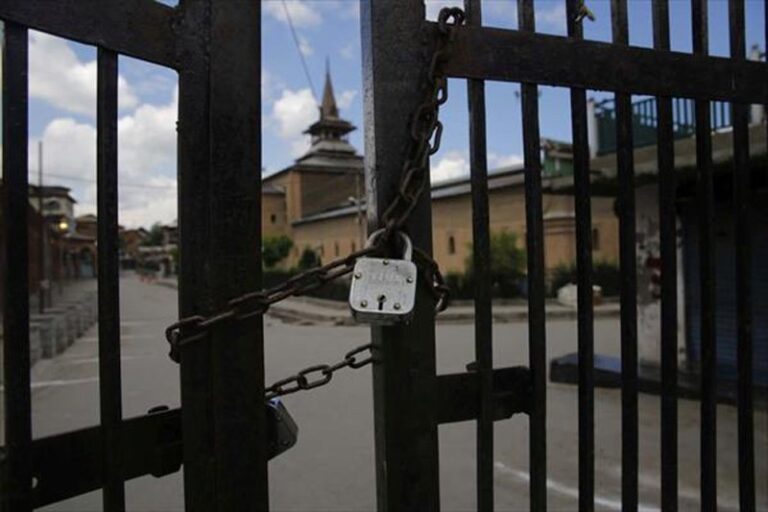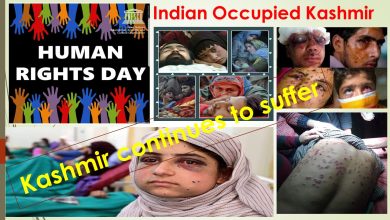Article: “Worship sites: Sanctuaries, not battlegrounds.” Muslims in IIOJK face perilous challenges each Friday
Qurat ul Ain Ali

Acceptance of the rituals prescribed by Allah Almighty and the Holy Prophet Muhammad (PBUH) serves as the Fundamental aspect of the global Islamic faith. The religious significance of these practices varies significantly across six major geographic regions, with Sub-Saharan Africa, Southeast Asia, and South Asia attributing high importance to them, while the Middle East and North Africa display varying degrees of significance. Central Asia and Southern/Eastern Europe, however, demonstrate a lower level of religious centrality. The frequency of prayers reflects this regional pattern, with higher rates observed in the Middle East, North Africa, Southeast Asia, South Asia, and Sub-Saharan Africa compared to Central Asia and Southern/Eastern Europe. These practices collectively constitute the Five Pillars of Islam, which include prayer, or salat, performed five times a day— at dawn, noon, mid-afternoon, sunset, and evening. The shahadah, or declaration of faith, is repeated at each call to prayer and concludes each prayer session.
In addition to this, in 2001, the Prime Minister of Portugal enshrined religious freedom into the nation’s legal framework to equalize the privileges historically enjoyed by the Catholic Church in Portugal and extend them to all religious communities in the country. This measure explicitly stated that no individual should be favored or discriminated against based on their religion, emphasizing that the state should not show bias towards any religious community over others. However, despite such legal frameworks, discrimination and persecution based on religious beliefs persist in many parts of the world, which is unacceptable in the modern era. Recognizing this, the United Nations has launched two new initiatives aimed at addressing hate speech and safeguarding religious sites.
These efforts aim to tackle some of the most pressing challenges facing Muslims in Indian illegally occupied Jammu and Kashmir (IIOJK) today. The Indian authorities, along with the military, administration, and politicians in IIOJK, bear collective responsibility for fostering anti-Semitism, Islamophobia, persecution of Christians, Sikh communities, and other religious groups, as well as various forms of racism, xenophobia, discrimination, and incitement to violence. Earlier this year, His Holiness Pope Francis, alongside the Grand Imam of Al-Azhar, Sheikh Ahmed al-Tayeb, signed a significant document emphasizing mutual respect and acknowledging the diversity of religions as intended by the Creator. This declaration underscores the inherent right to freedom of belief and the freedom to embrace differences.
Moreover, the desecration of historic Jamia Masjid, Srinagar, in August 1989, the violation of Dargah Hazratbal during a severe military siege in November 1993, and the destruction of Charar-e-Sharif in May 1995 are stark examples of India’s disregard for religious freedom in occupied Jammu and Kashmir. Additionally, authorities kept Jamia Masjid Srinagar closed for Friday prayers for three years following the August 05, 2019 move.
Recent events, such as the house arrest of Mirwaiz Umar Farooq and restrictions on other Imams offering prayers for peace and safety in Gaza and the Occupied Western part of Kashmir, highlight ongoing challenges. The closure of Jamia Masjid Srinagar and the ban on praying for Palestine constitute unjust acts, further compounded by the prolonged detention of Mirwaiz Umar Farooq since August 5, 2019. Correspondingly, the Indian security forces have been reported to have fatally shot one Kashmiri individual in Islamabad district, marking another instance of alleged state terrorism on December 24, 2021. This incident occurred on Friday, prompting authorities to impose restrictions on internet and mobile services in the region. Furthermore, the local populace was reportedly barred from offering Friday prayers at the historic Jamia Masjid in Srinagar for the 20th consecutive week, a move condemned by the Anjuman Auqaf of the Jamia Masjid as unwarranted interference in religious affairs. Meanwhile, United Nations human rights experts, based in Geneva, have urged Indian authorities to release prominent Kashmiri human rights advocate Khurram Parvez despite this there were no positive steps taken.
Elsewhere in India, in the Palamu district of Jharkhand state, a Hindu mob allegedly subjected a Muslim youth named Khustar Ansari to severe physical assault, including suspending him upside down from a tree. This incident has sparked condemnation from civil society activists within India. Additionally, there has been outrage over reported inflammatory speeches by members associated with Hindutva ideology, which allegedly incited violence against Muslims, at an event in Haridwar, Uttarakhand. Calls for immediate action against those inciting hatred under the guise of Hindutva have been echoed by activists.
Furthermore, on April 15, 2023, Indian governmental authorities once again implemented stringent measures, forbidding Friday prayers on the esteemed occasion of Jumat-ul-Wida at the historic mosque. Administration officials, in conjunction with Indian police personnel, took steps to secure the gates of the grand mosque, offering no explanation for their actions. The lack of rationale behind this sudden and arbitrary decision has left observers puzzled. Notably, this marks the fourth consecutive year in which Jumat-ul-Wida prayers have been prohibited at this revered mosque by the occupying authorities.
Simultaneously, a formal protest was lodged against the extended, unlawful, and arbitrary detention of Mirwaiz Umar Farooq, who has been under house arrest since August 5, 2019. A demand was articulated for his immediate release, particularly in light of significant Islamic events such as Shab-e-Qadr and Eid-ul-Fitr, to enable him to fulfill his religious obligations without obstruction.
Since 1947, every Friday has posed a significant challenge for Muslims in Srinagar’s Lal Chowk area as they assemble to participate in congregational Friday prayers at the mosque. However, the aftermath of these prayers brings forth a distressing reality for the worshippers. Following their religious observance, they become subjects of intense scrutiny and investigation by the Indian army. Regrettably, this scrutiny often leads to the forceful apprehension and subsequent arrest of numerous young individuals and children. What follows is a harrowing ordeal, as these detainees are subjected to humiliation and torture, despite lacking any just cause or evidence of wrongdoing. This recurring pattern of unjust treatment exacerbates the already tense atmosphere, casting a shadow of fear and oppression over the community’s religious practices.
In conclusion, there should be implementation of the efforts intensified by The United Nations with the launch of two new initiatives in recent weeks:
The first initiative is to focus on coordinating efforts across the UN system to combat hate speech, addressing its root causes and enhancing response mechanisms.
The second initiative involves an action plan for the UN to actively engage in efforts to protect religious sites, ensure the safety of places of worship, and freedom to offer religious prayers.
However, the situation underscores the urgent need for action by the Muslim world, particularly the Organization of Islamic Cooperation (OIC), Amnesty International, UN, and other human rights organizations to force India to enable Muslims to exercise their religious rights peacefully. The Indian occupation’s assaults on Islam and Muslims in occupied Kashmir have been both overt and covert. Freedom of religion or belief is enshrined in international human rights instruments, emphasizing the importance of protecting individuals’ right to practice their faith without discrimination or persecution.








